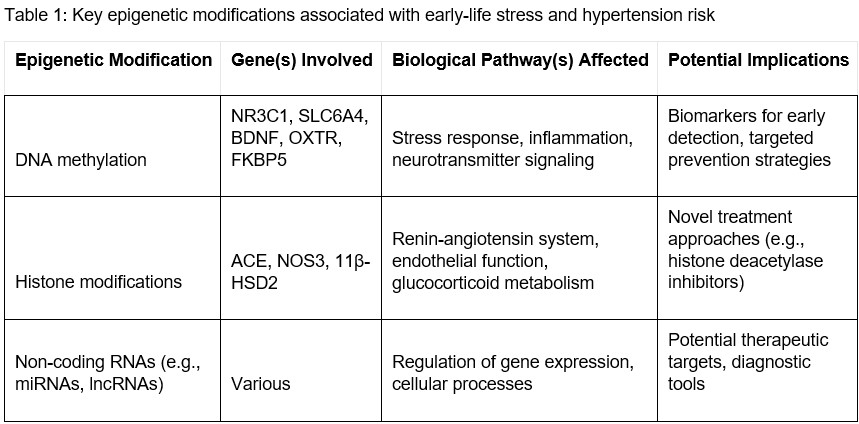Final ID: P-150
Epigenetic Mechanisms Linking Early-Life Stress to Hypertension Development: Implications for Prevention and Treatment
Abstract Body: Purpose: Adverse childhood experiences (ACEs) and early-life stress (ELS) have been identified as significant risk factors for the development of hypertension later in life. This review synthesizes current evidence on how ELS induces epigenetic modifications, particularly DNA methylation and histone modifications, that predispose individuals to hypertension and discusses the implications for prevention and treatment strategies.
Methods: A comprehensive literature review was conducted to identify studies examining the relationship between ELS, epigenetic modifications, and hypertension development. The search included studies investigating specific genes involved in stress response, inflammation, and cardiovascular regulation, such as NR3C1, SLC6A4, BDNF, OXTR, and FKBP5.
Results: Studies have shown that ELS exposure can lead to persistent epigenetic alterations in genes involved in stress response, inflammation, and cardiovascular regulation. These modifications may contribute to impaired stress reactivity, heightened inflammation, and dysregulation of the renin-angiotensin system and endothelial function, potentially leading to the development of hypertension. The identification of ELS-induced epigenetic signatures opens up new avenues for early detection and intervention. DNA methylation biomarkers could be used to identify individuals at increased risk for hypertension due to ELS exposure, allowing for targeted prevention strategies. Moreover, the reversibility of epigenetic modifications presents an opportunity for novel treatment approaches, such as the use of epigenetic drugs and lifestyle interventions to mitigate the adverse cardiovascular effects of ELS.
Conclusion: Understanding the epigenetic mechanisms linking ELS to hypertension development provides valuable insights for designing targeted prevention and treatment strategies. Future research should focus on translating these findings into clinical practice and developing personalized interventions based on an individual's ELS exposure and epigenetic profile. A multidisciplinary approach integrating epigenetics, stress neurobiology, and preventive medicine is required to address the long-term cardiovascular consequences of ELS effectively.
Methods: A comprehensive literature review was conducted to identify studies examining the relationship between ELS, epigenetic modifications, and hypertension development. The search included studies investigating specific genes involved in stress response, inflammation, and cardiovascular regulation, such as NR3C1, SLC6A4, BDNF, OXTR, and FKBP5.
Results: Studies have shown that ELS exposure can lead to persistent epigenetic alterations in genes involved in stress response, inflammation, and cardiovascular regulation. These modifications may contribute to impaired stress reactivity, heightened inflammation, and dysregulation of the renin-angiotensin system and endothelial function, potentially leading to the development of hypertension. The identification of ELS-induced epigenetic signatures opens up new avenues for early detection and intervention. DNA methylation biomarkers could be used to identify individuals at increased risk for hypertension due to ELS exposure, allowing for targeted prevention strategies. Moreover, the reversibility of epigenetic modifications presents an opportunity for novel treatment approaches, such as the use of epigenetic drugs and lifestyle interventions to mitigate the adverse cardiovascular effects of ELS.
Conclusion: Understanding the epigenetic mechanisms linking ELS to hypertension development provides valuable insights for designing targeted prevention and treatment strategies. Future research should focus on translating these findings into clinical practice and developing personalized interventions based on an individual's ELS exposure and epigenetic profile. A multidisciplinary approach integrating epigenetics, stress neurobiology, and preventive medicine is required to address the long-term cardiovascular consequences of ELS effectively.
More abstracts on this topic:
A Longitudinal 20-year Analysis Indicates Acceleration of Cardiometabolic Comorbidities on Dementia Risk
Lihua Huang, Danish Muhammad, Auyeung Tw, Jenny Lee, Kwok Timothy, Abrigo Jill, Wei Yingying, Lo Cecilia, Fung Erik
A blood biomarker of accelerated aging associates with cardiometabolic biomarkers in response to weight-loss dietary interventionsKou Minghao, Li Xiang, Heianza Yoriko, Bazzano Lydia

